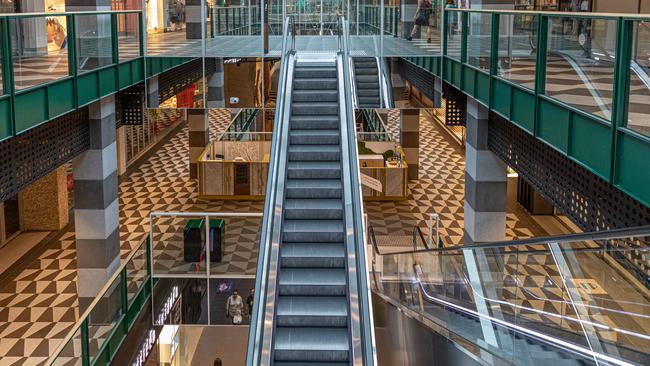Lockdown shopping a wipeout for traditional retail as online surges: UBS
With retail sales falling by record levels, up to 20 per cent of the nation’s shops will shut as shoppers shift online, UBS predicts.

Online sales will double in the wake of the pandemic, shifting the balance of power between landlords and tenants, while up to 20 per cent of mature bricks-and-mortar stores could shut for good, a report from UBS argues.
The report came ahead of ABS data showing retail spending fell a record 17.9 per cent in April as strict social and travel restrictions to curb the spread of the coronavirus hit demand. Seasonally adjusted retail spending fell $5.38bn to $24.73bn, according to preliminary data for the month released by the Australian Bureau of Statistics on Wednesday.
The slide was far worse than analysts’ consensus of a 5 per cent decline and followed a record jump of 8.5 per cent in March.
The decline was driven by the food retailing industry, which fell 17.1 per cent. Monthly turnover in supermarket and grocery stores for non-perishable and perishable goods fell 23.7 per cent and 15.3 per cent respectively, while there were further heavy falls in cafes, restaurants and takeaway food services.
The collapse in retail sales, along with a pivot to online shopping, is looming as a major new trend during the pandemic and is expected to continue after the health crisis passes.
UBS analyst Ben Gilbert said the shift online in the wake of COVID-19 would accelerate store consolidation, leaving retailers with short lease terms and strong online platforms well placed compared to landlords to improve profitability.
UBS ranked companies across the themes identified in its report and concluded that those companies best positioned to take advantage of the new conditions were JB Hi-Fi, Premier Investments, Adairs, and Kogan.com. Worst positioned were Myer and Wesfarmers, it said.
Mr Gilbert said he had lifted his medium-term expectations for online sales, excluding food, to account for about 17 per cent of the total market by 2024, compared to roughly 11 per cent at the moment. This acceleration in online sales would encourage retailers to slim their physical store network, he said.
Mr Gilbert said UBS saw “the potential for around 20 per cent of mature specialty stores to close by fiscal 2024” but that landlords’ ability to rejig space in malls would mitigate the impact of the closures. Nevertheless, UBS “acknowledges the retailer/landlord balance of power is shifting to retailers”, Mr Gilbert said.
“We estimate every 1 per cent per annum increase in non-food retail online sales penetration will drive a roughly 2 per cent per annum reduction in ex-food store numbers. Furthermore we believe sectors with high rent to sales will see changing rental structures, more equally balancing risk.”
The closure of many stores in March due to the health crisis triggered a boom in online sales. Most retailers have reported material uplifts in online trade, with Kogan reporting a rise of more than 100 per cent in year-on-year sales in April and Woolworths revealing more than twice the digital traffic to its site in March. Adairs reported 221 per cent online growth.
UBS said consumers were concerned about safety and more likely to shop online, while retail operators were looking to reduce risks and costs — both factors that would help entrench the popularity of online shopping.
UBS believes online penetration will accelerate and brands with physical store presences will decrease.
Jeweller Michael Hill International this month said it would not reopen some stores and would focus more on online sales, while Wesfarmers chief executive Rob Scott signalled the conglomerate, which owns Bunnings, Kmart, Target and Officeworks, would also invest more heavily online.







To join the conversation, please log in. Don't have an account? Register
Join the conversation, you are commenting as Logout